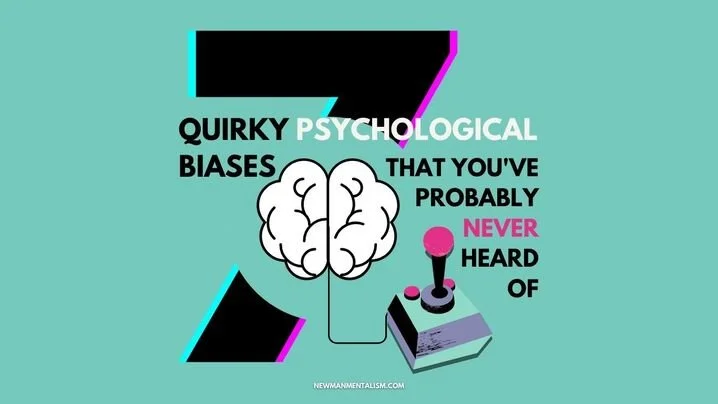7 Quirky Psychological Biases That You've Probably Never Heard Of
Whether you’re a corporate professional in a high-profile company, a customer shopping around for the latest and greatest products, a student, a homemaker, or anything in between, there are a lot of things that can affect how we see and interact with the world.
We often overlook the psychological factors that influence our decisions. It's easy to believe that we make rational and objective choices, but the truth is that our minds are subject to countless biases and cognitive errors that affect our judgment. Some of these biases are well-known, such as confirmation bias and the halo effect, but others are lesser-known and more peculiar.
So today, I want to explore seven quirky psychological biases that you've probably never heard of and how they can impact your work and life.
1. The Dunning-Kruger Effect
The Dunning-Kruger effect is a cognitive bias in which people overestimate their abilities or knowledge. The effect was named after David Dunning and Justin Kruger, who conducted a study in 1999 that found that incompetent people often lack the skills to recognize their own incompetence. As a result, they overestimate their abilities and are more confident than competent individuals. This bias can manifest in the workplace when employees who lack competence believe they are performing well and resist feedback or training.
2. The IKEA Effect
The IKEA effect is a cognitive bias in which people overvalue things they've invested effort into creating. The effect is named after the Swedish furniture company IKEA, which sells furniture in flat boxes that customers assemble themselves. Studies have found that people who assemble IKEA furniture rate it higher in quality and value than people who receive the furniture pre-assembled. This bias can apply to projects in the workplace when individuals value their contributions more highly because of the effort they've put into them.
3. Reactance
Reactance is a psychological response to being told what to do. When individuals perceive their freedom is threatened, they may act in ways that assert their independence, even if it's against their best interests. This bias can arise in the workplace when employees resist change or new policies because they feel their autonomy is being threatened.
4. The Spotlight Effect
The spotlight effect is a cognitive bias in which people overestimate how much others notice their mistakes or behaviour. Individuals believe they are the center of attention and feel more self-conscious than they need to be. This bias can lead to unproductive rumination or fear of speaking up in meetings, fearing others will notice any mistakes.
5. The Sunk Cost Fallacy
The sunk cost fallacy is a cognitive bias in which people continue investing in a project or decision because of the resources they've already put into it rather than considering the potential costs or benefits. As a result, people may continue to invest in projects that are unprofitable or have diminishing returns. This bias can lead to an inefficient allocation of resources in the workplace.
6. The Just-World Fallacy
The just-world fallacy is a cognitive bias in which people believe good things happen to good people and bad things happen to bad people. This bias leads individuals to attribute success or failure to the character of the individual rather than factors outside of their control, such as luck. This bias can result in blaming employees for performance issues or disregarding the role of external factors in project outcomes. It can also work in the other direction. If you see someone in a situation or position that you admire or respect, you’ll assume they are a good person. If you see someone in a bad position or situation, you’ll thing they’re deserving of that, too.
7. The Ostrich Effect
The ostrich effect is a cognitive bias in which individuals ignore negative information or risks because they fear the consequences of confronting them. This bias can lead to individuals disregarding warnings or failing to address problems, potentially leading to significant consequences down the line.
Being aware of these quirky psychological biases is essential for corporate professionals in high-profile companies. We want to make the best decisions for ourselves and the organizations we work for. By understanding our cognitive limitations, we can strive to make better decisions and avoid common pitfalls. It's essential to cultivate a mindset of curiosity and openness to feedback, recognizing that we all fall prey to these biases and can work to counteract their effects with self-awareness and reflection.

